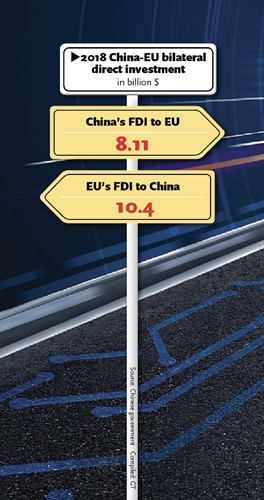HOME >> SOURCE
EU risks overplaying hand in BIT talks with China
By Wang Cong Source:Global Times Published: 2020/1/19 19:18:40
Both parties need investment pact to balance tensions with US

Photo: VCG

Graphics: GT

Graphics: GT
The EU could create uncertainty and risks for a bilateral investment treaty (BIT) with China, which otherwise has been progressing steadily and is set to be completed by the end of the year, if it resorts to a tougher approach in the negotiations as some are calling for, Chinese analysts said on Sunday.
Both China and the EU face a renewed sense of urgency as their respective trade tensions with the US linger, and they should focus on reasonable demands in the negotiations to reach a balanced BIT as soon as possible, rather than putting the talks in jeopardy, the analysts said.
A new round of negotiations is being held in Brussels ending on Monday, where the text of the BIT and lists of terms are being discussed, according to the Chinese Ministry of Commerce. The two sides "are striving to achieve as much progress as possible," the ministry said in a statement last week.
This marks the 26th round of talks between Beijing and Brussels over the BIT since negotiations commenced in February 2012. The talks picked up pace last year, after top leaders from both sides showed political support for the deal and set a timetable to complete it by the end of 2020.
However, even as negotiators are aiming to push forward the talks, some in the EU are calling for a tougher approach to the talks and hyping up assertions of unfair practices in China.
BusinessEurope, the leading organization for EU companies, released a scathing paper on Thursday, calling on the EU to rebalance its relationship with China to secure a "level playing field" and address systemic challenges posed by "China's state-led economy."
Through the BIT, the EU is pushing for a more level playing field and greater reciprocity for EU companies, and Brussels "will not conclude any agreement if the outcome is not what we're hoping for," EU Ambassador to China Nicolas Chapuis was quoted by the China Global Television Network as saying on Friday. Chapuis nonetheless expressed confidence that the deal could be completed this year.
Sabine Weyand, the European Commission's director-general for trade, also complained about the "snail's pace" in the BIT negotiations and called for more political commitment from Beijing, the Financial Times reported on December 17.
"I think the EU might be adjusting its demands in the negotiations, as the situation changes," Cui Hongjian, director of EU Studies at the China Institute of International Studies in Beijing, told the Global Times on Sunday, "There is relatively big uncertainty on the EU side."
The EU might be raising its demands, after China and the US reached a phase one trade agreement, under which China pledged to increase purchase of US products by $200 billion over the next two years, analysts said.
EU Trade Commissioner Phil Hogan said on Thursday that the bloc was watching the phase one deal closely to see if it is line with global trade rules, according to Reuters.
The phase one deal might have raised the sense of urgency for the EU to reach a deal with China as well as emboldened it to make more demands in the BIT negotiations, analysts said.
"I think the phase one trade agreement between China and the US might push the EU to adjust its strategy toward China," Ye Bin, a research fellow specializing in EU laws at the Institute of European Studies at the Chinese Academy of Social Sciences, told the Global Times on Sunday. "The EU also wants to think of a way to balance off [the phase one deal]."
The EU might focus on its long-standing accusations of unfair economic policies and market regulations in China in the negotiations, claims that China has repeatedly denied, and this could create obstacles for the negotiations, said Chen Fengying, a research fellow at the China Institutes of Contemporary International Relations in Beijing.
"They stress having a fair and balanced deal. China also wants a fair deal but its status as a developing country should be considered when determining what's fair and what's not," Chen said. "It is absolutely unfair to ask the same things of a developed economy and a developing one."
Chinese analysts also said that while China is gradually opening up its market, the EU has been tightening regulations for Chinese companies and investments. Although some EU officials indicated that the bloc would not ban Chinese telecom company Huawei, there are still calls within the body to do so.
Still, given the sense of urgency on both sides, many analysts believe that the BIT remains on track to be completed by the end of this year.
"Given both sides' political will, it can be expected that the deal will be reached this year," Ye said.
Posted in: ECONOMY